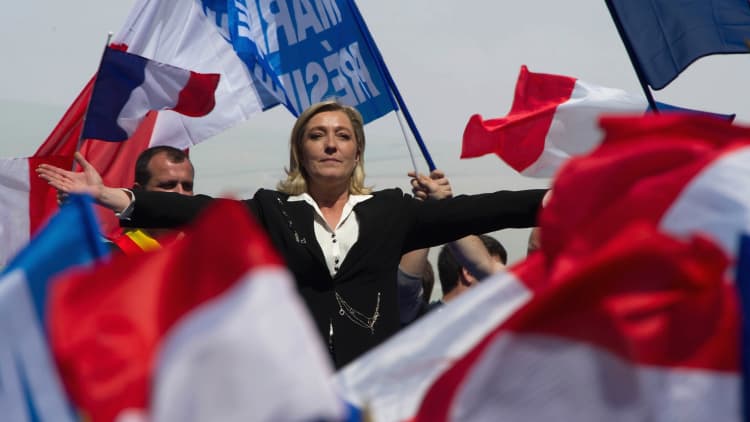
The far-right National Front (FN) party in France made strong gains in regional elections at the weekend, with analysts predicting further popularity for the party amid heightened concerns over "homegrown" terrorism and an influx of migrants to Europe.
With almost all votes counted, the FN was in first place with almost 28 percent of the projected vote nationwide and it has topped the list in at least six of 13 regions, according to the interior ministry. The ruling Socialist party and its allies took 23.3 percent, coming third after a group of center-right parties led by former president Nicholas Sarkozy, which took 27 percent of the vote.
The FN's leader Marine Le Pen said the result was "magnificent." "The people expressed themselves. And with the people, France raises its head," she said, according to Reuters.
The polls were held under tight security, according to the AFP news agency, and came amid a continued state of emergency in France imposed by French President Francois Hollande after the Paris attacks last month.
A second round of voting will be held on December 13 and, strategically, the Socialist party has already withdrawn from the second round in two regions in order to try to block a victory for the FN, Reuters reported. A withdrawal can help boost the vote of another candidate that has more of a chance of beating the FN.
The FN's victory has been widely viewed as a reaction to the recent terrorist attacks in Paris on November 13 in which 130 people died during gun and bomb attacks. The self-styled Islamic State militant group claimed responsibility for the attacks.
A number of the attackers were French and Belgium citizens, however, putting multiculturalism and Europe's founding principles of tolerance to the test. For many, the attacks highlighted the complexities and pitfalls of the region with integration (or lack thereof), high unemployment, disenfranchisement and the ease of movement between countries - which allowed key suspects to evade capture - coming under fire.
Rising levels of immigration in Europe, caused by many thousands of people fleeing war-torn Syria and other conflicts in the Middle East, have also given the far right a boost.
Antonio Barroso, senior vice president of risk consultancy Teneo Intelligence, said the elections were the first test of FN's political strength after the Paris attacks.
"The attacks, coupled with persistent high unemployment – which reached record-high levels in the third quarter – are further increasing the electoral appeal of the far-right party," Barroso said in a note Friday.
If the party makes more gains next week, it will change the outlook for 2017 presidential and parliamentary elections in France with the FN becoming a contender against the Socialists and center-right Sarkozy.
Barroso believed that it was still "highly unlikely" that Marine Le Pen will be able to win a presidential election, and added that "the electoral system will continue to constrain the growth of the party in parliament in the medium-term."
"Rather, the long-term risk is that the party uses the increased resources derived from access to office to expand its territorial reach beyond its traditional strongholds, thus progressively strengthening is presence nation-wide," he said.
Despite the limited upside for the FN in the long run, Barroso did not believe Hollande had much chance of re-election in 2017.
"Hollande will probably continue betting big on foreign policy ahead of 2017 and hoping that the economic recovery will pick pace. Short of a significant decrease in unemployment before that date, Hollande's re-election chances will remain slim, however."
- By CNBC's Holly Ellyatt, follow her on Twitter @HollyEllyatt. Follow CNBC International on Twitter and Facebook.



